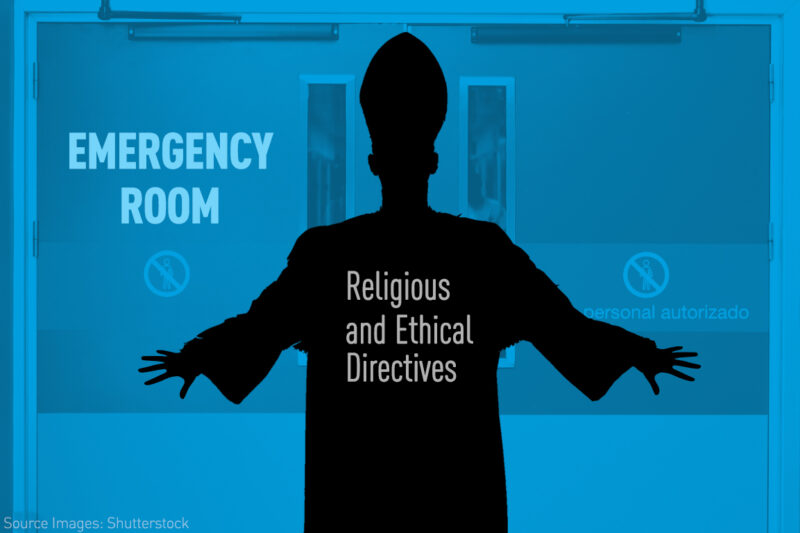
We’ve been fighting for nearly 100 years to protect religious freedom. Religious freedom, however, doesn't give people the right to use their beliefs to discriminate against and harm others. Yet a growing number of hospitals refuse to provide reproductive health care based on religious beliefs, including life-saving emergency care — allowing religious directives to trump best medical practice and patient health.
This week the Illinois House passed a bill that protects all patients, including women, ensuring they at the very least will have complete information about their health condition, rather than being sent home and denied information based on the hospital’s religious beliefs (the bill, Senate Bill 1564, previously passed the Senate).
When you look at stories like what happened to Tamesha Means, this bill is an important step toward progress. Tamesha rushed to Mercy Health Partners in Muskegon, Michigan, when her water broke after only 18 weeks of pregnancy. Based on the Ethical and Religious Directives for Catholic Health Care Services, promulgated by the U.S. Conference of Catholic Bishops, the hospital sent her home twice, even though Tamesha was in excruciating pain. There was virtually no chance that her pregnancy could survive, and continuing the pregnancy posed significant risks to her health. Because of Catholic directives, however, the hospital did not tell Tamesha that terminating her pregnancy was an option and the safest course for her condition.
Cases like Tamesha’s are not uncommon, and we’re only likely to see more with the proliferation of Catholic hospitals. It’s critical that Illinois Gov. Bruce Rauner sign this bill into law as soon as possible to help protect women like Tamesha who live in Illinois.
In Tamesha’s home state of Michigan just last week, legislators introduced a bill that would help ensure that women receive information about their health condition and that no woman is turned away from a hospital when her life or health is in jeopardy. If passed, the bill would prevent other women from experiencing what Tamesha went through. The bill is similar to one in Washington state that prohibits hospitals from tying a doctor’s hands and preventing the doctor from providing medically accurate and appropriate information, referrals, or services to patients.
As the ACLU of Illinois' Reproductive Rights Project Director Lorie Chaiten said:
“If signed into law, Senate Bill 1564 will mean that each patient in Illinois now can be assured that they will have complete information, so that they can make the best medical decision for themselves and their families. These medical decisions, we expect, will be guided by a patient¹s individual condition and his or her personal beliefs. Senate Bill 1564 means that when Illinois patients go into an exam room, they do not need to worry that they are being denied medical information based on their health care provider¹s religious beliefs.”
Or to put it simply, these bills make clear that freedom of religion doesn't allow anyone to put women and others in harm's way.
These are important steps to protecting women in those states, though the problem is not limited to Illinois, Michigan, and Washington. In 2016, one in six hospital beds in the U.S. are in a facility that complies with Catholic directives. We recently issued a report in which women and their health care providers tell their heartbreaking stories of the denial of care at Catholic hospitals in various parts of the country. We are also calling on the federal government to enforce federal law that protects women seeking emergency care. We know the Centers for Medicare and Medicaid Services has received complaints about the denial of care at Catholic hospitals, and we filed a federal lawsuit this week to obtain those complaints.
Stand with us in calling on the federal government to investigate these hospitals and hold them accountable for denying women necessary care.





